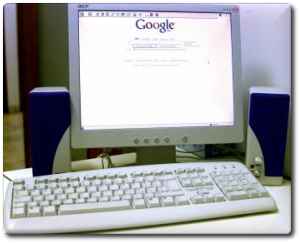Friday, November 18th, 2005, 10:38 am
Is Google the Next Microsoft?

 NOWLINGLY or unknowingly, whether deliberately or not, Google is striving to become a Web monopoly. As the Web is bound to become the centre of all, such monopoly can affect each and every aspect of our lives.
NOWLINGLY or unknowingly, whether deliberately or not, Google is striving to become a Web monopoly. As the Web is bound to become the centre of all, such monopoly can affect each and every aspect of our lives.
Google’s primary target appears to be Web services and their constant expansion, often superseding and replacing desktop equivalents in the process. What has Google implemented thus far? Below is nothing more than a partial list:
- Statistics: notably Google analytics, which can now help study the roots of traffic, in-site PageRank distribution, crawling patterns and so forth. This requires Webmaster to sign up with yet another service: Google Sitemaps.
- Web reading – e.g. Google Reader (for feeds), Google News, and Google Blog Search.
- Image search – equivalent to a digital photography library, which neglects or discourages fair use
- Desktop search
- Google Wallet – potentially making on-line banking and highstreet banks obsolete
- Mapping services
- E-mail and broader communication (Google Mail, Google Talk)
- Google Directories (DMOZ)/Google Base
- Literature – Google Print (just been renamed for fairly valid reasons)
What have Google not implemented yet? Can we identify what Google set as potential revenue targets?
- Games
- Office suite
- Music management (video gets closer)
- Graphical toolkits
- Web design facilities and/or hosting (Geocities) – Blogger and Blogspot make the exception
- Photo album management
- Bookmarks like
del.icio.us(with the exception of Google Personalised that is only a step away)
Google can never replace very few elements:
- Hardware
- Operating system
- Web browser, with the exception of Google’s Web Accelerator (proxy/cache)
[Note: The lists above are intentionally incomplete. They are intended to serve as support for an argument rather than be a comprehensive reference]
Google have already teamed up with Firefox (Mozilla), Sun Microsystems, and a variety of other cross-platform advocates. Google are also avid Linux users and supporters, so one wonders if Open Source or openness in general can take the place of Windows and give Google collateral control at the expense of Windows.
Bill Gates considers major losses to Google as an option. Google were portrayed as the main rival/threat and Gates urged his employees to focus on so-called ‘Live Software’ and on-line services. Mapping services, book scanning and the like have already been copied by Microsoft in what appears to be a catch-up game.
Google have seen enormous growth owing to constant innovation and superb recruiting. Meanwhile, Microsoft failed to evolve, refusing a move to the Net at the expense of their own shrink-wrapped software monopoly. Commercial software in general appears to be taking a slow dive, so the next 5 years will reveal a significant change. We are currently standing at the busy interchange.






 Filed under:
Filed under: 